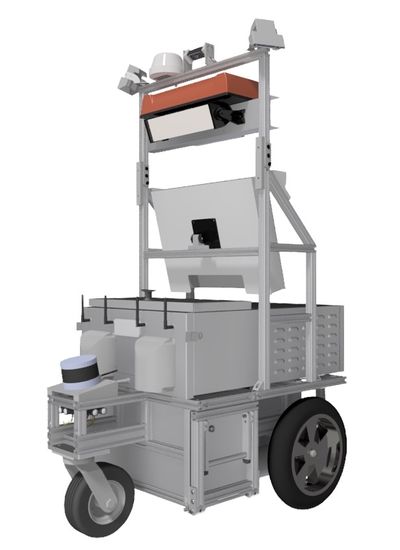RoboNav
URC is a multi-stage competition which involves designing, building, and commanding a rover-style robot in both manual and autonomous challenges. The competition is meant to simulate the conditions faced by Mars rovers, and as such consists of several missions: determining the presence of life in soil samples, retrieving rocks and other items, servicing equipment, and autonomously navigating the surface of "Mars" (actually the deserts of Utah). Teams must qualify through various reports and video submissions before being invited to compete. The RoboNav team has competed in the 2024 and 2025 competitions and hopes to qualify again in 2026.
Contents
Meeting Times
We meet in the Student Competition Center (575 14th St). If you are working in the machine shop or mechanical room you will need to wear closed-toe shoes and a t-shirt (no long sleeves). Bring a hair tie if needed.
- Wednesdays 6:30PM to 9PM
- Sundays 4PM to 7PM
Current Leadership
- Project Manager: Dylan Winer
- Mechanical Lead: Cooper DelGandio
- Electrical Lead: Lindsey Zhang
- Software Lead: Mrinal Jain
- Science Lead: Madelyn Wayne
- Drone Lead: Michael Lagana
- MRC Lead (new member training): Ellie Pierburg
Competition
Guidelines
Important Dates
- May 28 - May 31, 2025: 2025 University Rover Challenge
Past Competitions
| Bot | Competition Years | Versions | Design Reports |
| WALL-I | 2022 - 2025 | Wall-I, Wall-II |
|
| Jessi | 2018 - 2019 | Jessi, Jessii, Jessiii |
|
| Woodi | 2017 | See Jaymi | Jaymi's design report was submitted for Woodi. |
| Jaymi | 2016 | See Woodi | Jaymi Design Report |
| Misti (IGVC) | 2013 - 2015 | Misti, Mistii |
|
| Roxi | 2011–2012 | Roxi, Roxii |
|
| Jeanni | 2010 | Jeani | Jeani Design Report |
| Candi | 2007 - 2009 | Candi, Candii, Candiii |
|
| Trixxie | 2006 | Trixxie | Trixxie Design Report |
| Buzzbot | 2003 - 2004 | Buzzbot, Buzzbot II |
|
Gallery of Past Robots
The Year of No Robot
In 2005, a year of transition, RoboJackets lacked the manpower to send a team to competition.
Subteam Resources
Mechanical
Overview
- The URC Mechanical Team designs, integrates, and tests all structural and mechanical systems on our rover platform, including:
- Chassis and suspension design (currently a four-wheel rocker suspension with carbon-fiber leg joints)
- Robotic arm structure, kinematics, and custom cycloidal gearbox
- Science module mounting, coring drill integration, and modular payload interfaces
- Wheel and drivetrain component selection, bearing integration, and fabrication
- Structural analysis (FEA), load testing, and weight optimization
- Thermal and environmental protection, sealing, and serviceability features
Training info
- All new members complete a structured onboarding sequence:
- MRC orientation: the Mini Rover Challenge (MRC) is an internal, small-scale rover build-and-drive competition that gives hands-on experience in mechanical design, prototyping, and assembly before advancing to full URC rover
- CAD modeling (SolidWorks), drawing standards, and version control best practices
- Finite-element analysis (ANSYS, SolidWorks) and stress analysis fundamentals
- CNC machining, mill, lathe, water jet, 3D printing, composite layup, and shop tooling safety
- GD&T, tolerancing, and manufacturing drawing review
- Assembly procedures, torque specifications, and preventative maintenance protocols
Electrical
Overview
- The URC Electrical Team designs, integrates, and tests all electrical and embedded systems on our rover platform, including:
- High-voltage battery packs & Battery Management System (BMS)
- Power Distribution Units (PDUs) and custom PCBs
- Motor controllers and real-time control loop firmware
- Sensor interfaces (IMU, LiDAR, cameras, encoders)
- Communication networks (CAN bus, ROS2, Ethernet)
- Wiring harness design, cable routing, and ESD protection
Training info
- All new members complete a structured onboarding sequence:
- MRC orientation: gives hands-on experience in electrical integration and control before advancing to full URC tasks
- High-voltage safety & ESD handling
- Soldering, PCB assembly, and DFM/DFT best practices
- Harness layout, strain relief, and cable management
- CAN bus, message arbitration, and ROS2 node communication
- Embedded firmware development (Teensy toolchains)
Software
- Overview
- Training info
